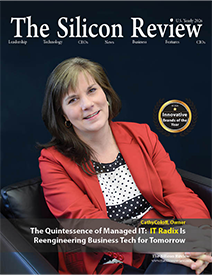50 Most Trustworthy Companies of the Year 2023
Alif Semiconductor – Addressing the rapidly growing market need for scalable and secure AI
The Silicon Review
![]()
Modern day, enterprise Artificial Intelligence applications require a scalable and cost-effective compute architecture, especially those that are used to optimize the scheduling processes for semiconductor manufacturing. Artificial intelligence/machine learning (AI/ML) has the potential to generate huge business value for semiconductor companies at every step of their operations, from research and chip design to production through sales. AI/ML will dramatically accelerate in the semiconductor industry over the next few years. Taking steps to scale up now will allow companies to capture the full benefits of these technologies.
The semiconductor industry is at a turning point, and companies that don’t devote significant resources to AI/ML strategies could be left behind. Although semiconductor companies may take different approaches, depending on business model, experience with AI/ML, and strategic priorities, the goal is the same: to take productivity and innovation to new levels. f organizations form tight links between the AI/ML function and the business side, it will be significantly easier to take the user’s perspective when initially designing the use case.
Alif Semiconductor was founded in 2019 with the vision to address the rapidly growing market need for broad, scalable, and connected AI-enabled embedded computing solutions that are genuinely power efficient. This need led to Alif Semiconductor’s creation of a new class of embedded controllers, or fusion processors, that enable seamless integration of technology for everyday life by unlocking innovative low-power techniques, unparalleled functional integration, accelerated AI and ML edge processing, high security, ubiquitous wireless connectivity, and operating system diversity.
Semiconductor Manufacturing Now Made Simple
Ensemble™ Family: Alif delivers semiconductor and software technologies that make embedded devices significantly smarter while securely connected. Portable battery-powered or stationary IoT edge node products, simple or complex applications – it does not matter - the spectrum is covered by one of their solutions. Ensemble Family devices are a scalable and compatible continuum of highly integrated embedded processors. Architected for power efficiency and long battery life, these devices deliver high computation and ML/AI capability, high-speed connectivity including Ethernet and SDIO, multi-layered security, computer vision, and rich graphical user interfaces. Individual device selections in the family scale up starting from single-core MCUs, to dual-core MCUs, advancing to triple-core and quad-core fusion processors to match specific applications. It can be used across all devices is a common fabric of features and technology making it easy to re-use software and hardware over varied projects.
Crescendo™ Family: Crescendo Family devices are a scalable and compatible continuum of highly-integrated embedded processors. Architected for efficiency and long battery life, these devices deliver high computation and ML/AI capability, wired and wireless connectivity including LTE IoT cellular, integrated SIM, multi-layered security, computer vision, and highly interactive human-machine interface. Individual device selections in the family scale up starting from single to dual-core MCUs, advancing to triple and quad-core fusion processors to match specific application needs. There is a common fabric of features and technology making it easy to re-use software and hardware over varied projects.
Biometric Access Control: The system grants access through a door or building entrance with successful verification of face and fingerprint using AI/ML. System is connected via Ethernet, with cellular Cat-M/NB as backup. GNSS registers location. MIPI-CSI connects camera for facial ID. MIPI-DSI connects color display and enhanced by a 2D GPU. I3C connects fingerprint sensor. Transaction data plus images and audio are logged to SDHC card. It offers simple RF enablement with minimal external components. Software based on Linux and RTOS for maximum optimization of networking, graphics, and real-time control. AI inference for facial and fingerprint ID accelerated by NPUs. It offers single-core to quad-core processing, AI acceleration, LTE Cat-M1/NB1/NB2 wireless, integrated SIM cellular subscriber management, GNSS positioning, and much more.
Parking Spot Finder: A sealed module buried just below asphalt surface senses the presence of a car parked above. Low-power Cat-NB connectivity enables 10+ year battery life while reporting status to cloud for parking spot management applications serving city streets or parking structures. It enables high penetration nature of Cat-NB radio characteristics good for subterrain parking garages. iSIM eliminates need for eSIM devices and plastic SIM cards to simplify logistics, reduce cost, and reduce power consumption. Optional camera connection on the low-power CPI interface enables other forms of parking vacancy detection through imaging and low-power AI acceleration.
The Visionary Leader
Syed Ali is the Chief Effective Officer of Alif Semiconductor. Prior to this Syed served as VP of Marketing and Sales at Malleable Technologies, where he was a founding management team member, leading to the acquisition by PMC Sierra. Mr. Ali also served as Executive Director at Samsung Electronics where he started the flash memory and CPU businesses. Syed co-founded Cavium Networks, where he served as President, CEO, and Chairman of the Board. Syed’s timely vision and leadership in secure high-performance networking equipment enabled him to take Cavium public in 2007 grow the company’s revenue to $1B+, and close an acquisition by Marvell Technology for $6B+.
Mr. Ali was named winner of the Ernst & Young Technology Entrepreneur of The Year 2008 award for Northern California, an award recognizing those who build and lead dynamic, growing businesses. Syed continues activities that give back to the engineering community.
Syed received a BSEE from Osmania University, Hyderabad, India and an MSEE from the University of Michigan.


_2025-12-15_12-44-58.webp)

_2025-11-17_06-38-14.webp)
